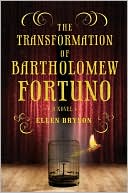 The Transformation of Bartholomew Fortuno: A Novel
The Transformation of Bartholomew Fortuno: A Novelby Ellen Bryson
Oh, those marketing guys over at Henry Holt & Co. are good! They did a great job of capturing my interest in Ellen Bryson's debut novel The Transformation of Bartholomew Fortuno (TToBF) by comparing it to two beloved books, Geek Love and Water for Elephants. And I can't even complain that the comparisons aren't apt.
Like Geek Love, TToBF is the story of... well, some "human curiosities." Bartholomew Fortuno is an employee (performer? exhibit?) in P.T. Barnum's American Museum in New York as the Civil War is winding down. He is billed as "the world's thinnest man," and he just may be. His best friend is, of course, Matina, the fat lady. Like the characters in Geek Love, Fortuno views their differences as "gifts." While TToBF does share a bit of Geek Love's darkness, that's where any similarity ends. What're missing are the black humor, the wonderful satire, the knock-out prose, and the pure weirdness of Dunn's brilliant novel.
Like Water for Elephants, TToBF is a period novel--albeit one set 70 years earlier--with a male first-person narrator. And while these performers don't work for a circus (Barnum wasn't in the biz yet) some of the trappings and much of the hokum are the same. Unfortunately, Ellen Bryson can't (yet) hold a candle to Sara Gruen as a story-teller. Any comparison only serves to highlight TToBF's inadequacies in terms of character, of pacing, and of narrative substance.
The catalyst of this tale occurs in the opening pages. Unable to sleep, Fortuno happens to be looking out the window late one night just in time to observe Barnum's unexpected return with a mysterious veiled woman. Eventually she is revealed to be a new curiosity, Iell Adams, a bearded lady. From that first glance, Fortuno's obsession with this woman grows exponentially and inexplicably, putting what had been an odd but orderly life into turmoil. There are all sorts of allegiances, agendas, and intrigues within the insular museum community that get set into motion.
Reading over what I just wrote, this still sounds like a pretty interesting book--and it wasn't terrible--but neither was it good. Let's start with Fortuno. We spend the entire novel inside his head, and the two words that come to mind to describe him are: prissy and neurotic. These are not attractive qualities, but he fits in well with his colleagues; there wasn't a single character in this book that I found to be likeable. Given that, it's awfully hard to care what happens to them. Take Fortuno's pursuit of Iell, for example. Eventually he proclaims himself to be in love. If that's love, well, yuck. Just... yuck.
There are small intrigues that propel the story, but they were thin material to keep a novel going. Given the fascinating setting, it was all surprisingly boring. The pace felt glacial, and when the "big reveals" finally came, I could not have been less surprised. "It's not terrible" is faint praise indeed. My advice is go read Water for Elephants or Geek Love. You'll be better off.
Comment Permalink
No comments:
Post a Comment